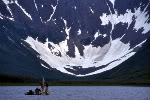Researchers examining 43 million satellite measurements of Antarctica’s thinning ice sheets and 7 million of Greenland’s, show that the ice is melting faster than expected. Published in Nature the research is the most comprehensive picture to date of the melting glaciers, allowing scientists to better predict how sea levels may rise.
Researchers say that the most extreme ice loss is due to glaciers speeding up where they flow into the sea. With these new measurements, gathered by lasers on satellites, the authors found that the thinning of glaciers is now occurring at all latitudes in Greenland. The melting has also increased on Antarctic coastlines and has spread deep into the interior of ice sheets.
“We were surprised to see such a strong pattern of thinning glaciers across such large areas of coastline – it’s widespread and in some cases thinning extends hundreds of kilometres inland. We think that warm ocean currents reaching the coast and melting the glacier front is the most likely cause of faster glacier flow. This kind of ice loss is so poorly understood that it remains the most unpredictable part of future sea level rise,” says lead author Dr Hamish Pritchard from the British Antarctic Survey.
Fast-mowing glaciers are melting quicker than slow-flowing ice, according to the study. In Greenland the researchers found that 81 of 111 fast moving glaciers are melting at double the rate of slow-flowing ice at the same latitude.
Some glaciers in West Antarctica—such as Pine Island, Smith, and Thwaites glaciers—are thinning by up to nine meters every year.
Related articles
Sea levels set to rise as Arctic warming replaces millennia long natural cooling cycle

(09/03/2009) According to a new study published in Science the Arctic should be cooling, and in fact has been cooling for millennia. But beginning in 1900 Arctic summer temperatures began rising until the mid-1990s when the cooling trend was completely overcome. Researchers fear that this sudden up-tick in temperatures could lead to rising sea levels threatening coastal cities and islands. “Scientists have known for a while that the current period of warming was preceded by a long-term cooling trend,” said lead author Darrell Kaufman of Northern Arizona University. “But our reconstruction quantifies the cooling with greater certainty than ever before.”
Summer sea ice likely to disappear in the Arctic by 2015
(08/31/2009) If current melting trends continue, the Arctic Ocean is likely to be free of summer sea ice by 2015, according to research presented at a conference organized by the National Space Institute at Technical University of Denmark, the Danish Meteorological Institute and the Greenland Climate Center.
Record global ocean temperature in July
(08/19/2009) The world’s ocean surface temperature was the warmest on record for July, breaking the previous record set in 1998, reports NOAA’s National Climatic Data Center. At 62.56°F (16.99°C), ocean temperatures were 1.06°F (0.59°C) above the 20th century average.